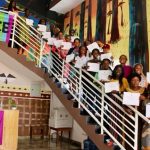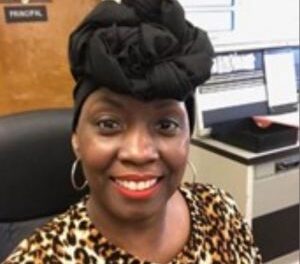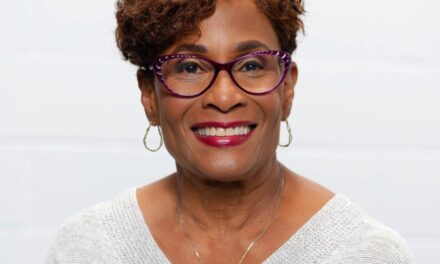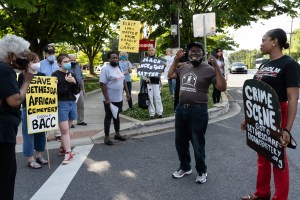By Neal Reid
Auburn University
More than 5,000 miles from “the loveliest village on the Plains,” Brittany Branyon had a life-changing moment only dreamed about by most educators and students.
The doctoral student and mother of two was busy working with Auburn University Department of Political Science associate professors Kelly Krawczyk and Bridgett King as part of a group of graduate students on a weeklong study trip to Monrovia, Liberia, when she experienced an “aha” moment. Branyon – who earned her bachelor’s in political science from Auburn and a master’s in international relations from the University of Oklahoma – was helping teach a group of students from the Gbowee Peace Foundation Africa when her future goals as an academic and professional advocate became crystal clear.
“In that moment, everything came full circle,” said Branyon, whose doctorate will be in public administration and public policy. “From seeing and reading about the civil war that was happening in Liberia years ago and the women like (Nobel laureate) Leymah Gbowee who made such a difference, to being there talking with these women – we were teaching them, but they could have been teaching us.
“I thought, ‘I’ve got to come back, I’ve got to keep doing this. There’s got to be a way.’ I think I emailed (Krawczyk) that day and said, ‘I don’t know how I can keep doing this, but I need you to teach me how.’”
Krawczyk has been taking Auburn University students to African nations for seven years as the study abroad element of the Master of Public Administration and joint Public Administration and Public Policy doctoral program. The most recent trip was part of the Public Administration, Civil Society & Democracy course.
The course was structured around the three legs of academia: teaching, research and outreach. Students led classroom instruction, delivered training workshops, collaborated on ongoing research projects and conducted focus groups with participating constituents.
Auburn’s group was tasked with developing curriculum that helped provide instruction for nearly 50 students from African Methodist Episcopal University (AMEU) and the University of Liberia. The Auburn students facilitated and implemented a qualitative field research short course for undergraduates on site at AMEU.
Auburn students designed and delivered capacity-building training to Liberian civil society organizations. It included a program in advocacy, community mobilization and social justice for the Gbowee Peace Foundation Africa, and a marketing and resource development workshop for the nongovernmental organization (NGO) Hope Alliance Liberia.
As part of the qualitative research course, Auburn students wrote a 70-page, self-contained course manual and a 40-page training manual, and took the lead on the program’s implementation.
“They learned a lot about best practices and then actually went out and did it, and I think they learned how things can happen in the field and how you have to adapt and be flexible,” Krawczyk said. “This course is designed to be all experiential learning, and students have gained real-world, applied, global experience that they can then list on their resumes. The students did all of it – they designed it and implemented it, and we just supervised.”
The chief aim of Auburn’s visit was to develop and implement international service learning activities.
“They did an amazing job and created this whole plan when we got to the school to create three different marketing videos that would be suitable for their website and social media,” Krawczyk said. “One is a historical 30-second video about the school, its founder, its development and what the mission of the school is. The second video is going to be kind of a fundraising video, and the third video will be about an adopt-a-student program they were helping move forward. They did all of that, did interviews and took video while we were there, and the school’s students and staff were in the videos.”
Auburn doctoral student Elena Roversi jumped at the chance to participate in the excursion.
“I’ve always dreamed about being a good actor in society,” said Roversi, who has worked with UNICEF in Senegal. “I think you can change people’s lives in different ways, and one of those is what we did in Liberia. It was more about trying to strengthen the universities there, helping the students decide what’s best for them and giving them knowledge so they can have more opportunities and options.
“It was good that we could share what Auburn, and particularly our program, could offer them. I really enjoyed my time there, and the people were incredible.”
Making a long-standing impact
Krawczyk has headed Auburn’s program and established roots in numerous west African countries during her tenure, traveling with students to Nigeria, Ghana, South Africa and Liberia. Each trip is different, with specific goals and designs in mind.
“We tailor it each time to the students in the course and the country case study,” Krawczyk said.
King, a scholar who studies elections in developing democracies like Liberia, was excited to make the trip along with a half-dozen graduate students.
“It was interesting and exciting to see them taking ownership of the curriculum and its instruction in a new environment they weren’t familiar with,” said King, who directs the College of Liberal Arts’ political science public administration program. “I appreciated the cultural awareness and competency lens they used to approach the instruction for the students.
“The Auburn students really embraced the experience we took them on, full force. They really had no idea what they were getting into beyond, ‘We’re getting on a plane, we’re going to teach and deliver curriculum.’ The openness and awareness with which they approached all of the things we did I appreciated, and I think the university and NGOs in Liberia did as well.”
The collaboration was an equal and beneficial exchange of learning opportunities and ideas.
“The interaction with the students and their ideas was very fulfilling since they were sharing their life experiences with us,” said Roversi, who with Branyon is co-authoring a paper about feminist perspectives in Liberia. “These types of programs and experiences are really important for universities like Auburn to provide for students.”
Branyon said the Auburn team found the Liberian students and NGO representatives eager to learn.
“They’re already advocating for their causes but are just trying to fine-tune things,” Branyon said. “It almost feels like advocacy and community mobilization is in their blood because their democracy is so new and they have actively fought for what they have. They’re also very hungry for communications, marketing and fundraising support and learning how to do that, both at the grassroots level, but also for donors who may be interested.”
Before the trip, Auburn’s group organized an educational supply drive, taking with them workbooks, classroom books, puzzles, games, markers, pencils and a talking globe. They worked with an Auburn nonprofit, Oslyn Rodriguez’s Backpack International, that provides backpacks filled with supplies to schools around the world. The partnership produced 70 backpacks filled with supplies for Liberian students.
“We traveled with 18 suitcases, and we left nine of them there,” Krawczyk said.
The benefits to the Liberian universities were profound.
“This workshop was so clear in its teaching, and the facilitators were knowledgeable and patient with the students,” said Sylvestine Gbessagee, chair of social work at AMEU. “The students and faculty, as well as I, enjoyed the training workshop in a topic that we all felt was difficult.”
Hope Alliance Academy founder and Executive Director Benedict Quato was effusive with praise for the Auburn program.
“Our adopt-a-student campaign, which is largely supported through this collaboration, is keeping 10 kids from underprivileged families at our school in Johnsonville,” Quato said. “The collaboration has made Hope Alliance Liberia a better organization, and we anticipate a long-term collaboration going into the future. It has truly been a blessing.”
This story originally appeared on Auburn University’s website.











